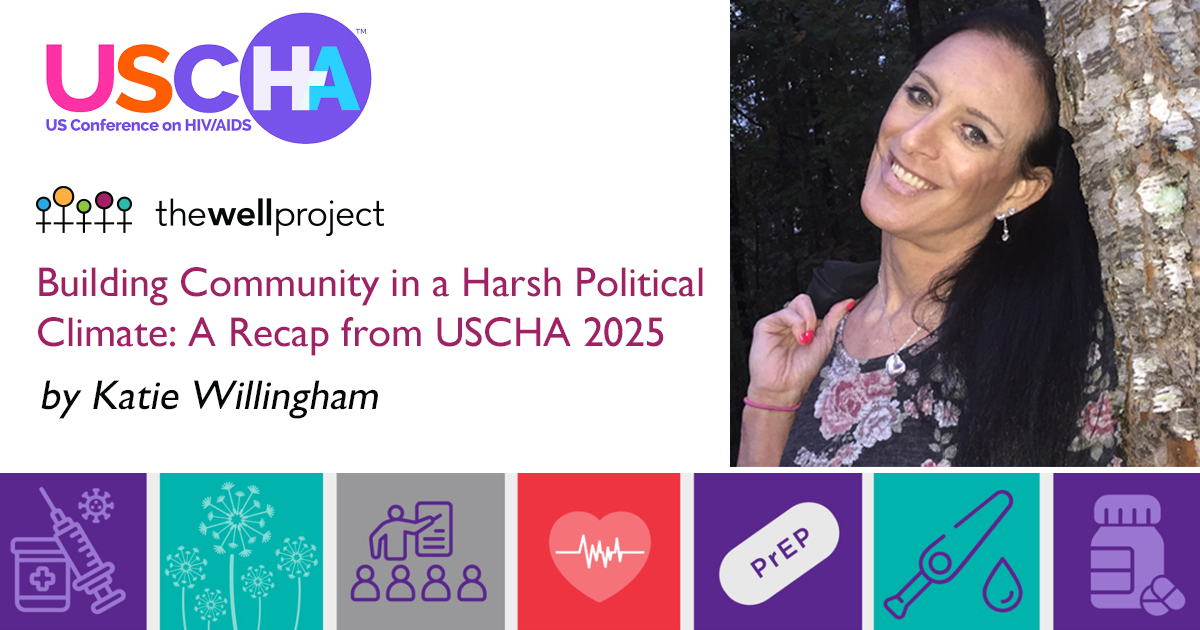
By Katie Willingham
Amid turmoil and uncertainty in Washington, DC, and across the United States, this year's US Conference on HIV/AIDS (USCHA 2025) descended yet again on the nation's capital from September 4 – 7. The theme of the gathering was Aging with HIV, and all sessions incorporated that crucial lens in some way. Members of The Well Project's community were involved in the conference on various levels, reporting on as well as presenting at the nation's largest HIV community meeting.
"Living, Thriving, and Demanding Better: Aging with HIV in a Shifting Political Climate" was a panel discussion, convened as part of the US PLHIV Caucus Institute, about aging with HIV and what that means for different people. The panelists in this discussion were advocates and healthcare professionals from various communities: Malcolm Reid, a Black gay man; Vanessa Johnson, a heterosexual Black woman; Edward Lowry, a Black heterosexual man; and Porchia Dees, a Dandelion (someone who was born with HIV) – along with myself, a Caucasian/Native American bisexual, two spirit woman of transgender experience, and moderated by Linda Scruggs of The Reunion Project, a nonprofit advocacy organization dedicated to helping people aging with HIV. It was a riveting conversation.
Vanessa began the discussion by talking about political determinants of health versus social determinants of health. I found this really interesting and powerful. We as advocates well understand the social determinants of healthcare – the need for things like housing, employment, food security, etc., that can affect our health – and we've been fighting for these things for decades. But political determinants of healthcare are things like voting, voting rights, political activism, etc., and these are the roots of our issues. Social determinants are the symptoms, but addressing the symptoms alone gets us little to nowhere; the problem must be resolved through action, political action.
Then the panel continued the discussion, with questions from the moderator and the audience. Each panelist answered questions and spoke about their own personal experience of living and aging with HIV. I was asked about what I considered to be my greatest strength, and greatest challenge, my answer was the same for both … community. Community is my greatest strength, because I know my community supports me, helps me, and cares about me; but that's my advocacy community, which is all over this country. I see them digitally from time to time and I see them at conferences, but when I'm home there is no community, my clinic doesn't have support groups anymore and it's nearly impossible to just meet other people who are HIV positive. It's not a usual topic of conversation and it's not something you just ask someone: "Are you HIV positive? Me too! Let's be friends." It just doesn't work that way. So how do you find your community where there is none? This is a challenge.
I saw this challenge years ago and so I created a Facebook group for transgender people in my state, and another to raise awareness about HIV. They've both been thriving, and helping trans people and people living with HIV find each other and get advice or information from one another, for almost ten years now. This is just one way to build a community; there are others, but we need more.
Overall, I was very happy with the discussion and my place in it, and I was honored to be a part of this panel.
More from The Well Project on the 2025 United States Conference on HIV/AIDS (USCHA 2025)
The 2025 U.S. Conference on HIV and AIDS | On The Ground by KatieAdsila on A Girl Like Me
Centering Pleasure, and How Providers Can Help: A Recap of USCHA 2025
Crafting Tools to Communicate HIV Care Gaps: A Recap from USCHA 2025
Understanding the Burden of Survival for Women: A Recap from USCHA 2025




